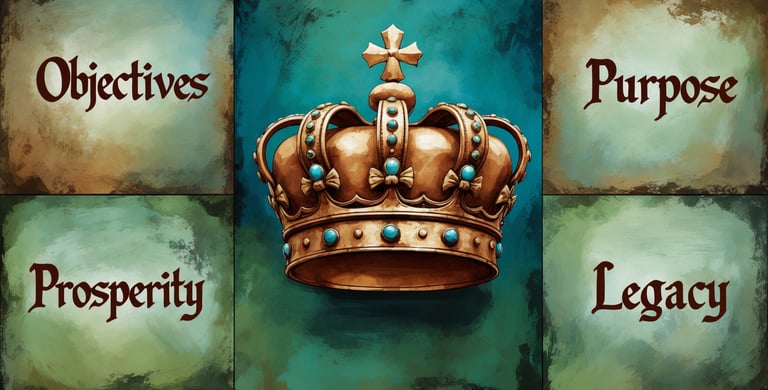Financial Stewardship and Kingdom Prosperity
Multiplying Wealth With Moral Gravity and Strategic Dominion
4FORTITUDEO - OBJECTIVES, PURPOSE, PROSPERITY, LEGACY
Financial Stewardship and Kingdom Prosperity
Multiplying Wealth With Moral Gravity and Strategic Dominion
“The rich rules over the poor, and the borrower is the slave of the lender.”
— Proverbs 22:7
Provision Is Not Optional for the Righteous Man
A man’s ability to provide is not merely a skill. It is a test.
It reveals how well he governs. How long he can withstand pressure. How seriously he treats the structure of his household.
Wealth is not evil. But misgoverned wealth is a doorway to decay.
And a good man without provision is vulnerable to compromise, drift, and manipulation.
This is why God praises stewards, not just givers.
Why Christ warns about burying talents.
Why Solomon ties wisdom to inheritance.
The Stoics warned that misalignment to nature leads to ruin. In like manner, the man who fails to master the natural laws of economic flow becomes a slave—no matter how spiritual he claims to be.
What Kingdom Prosperity Actually Means
Prosperity has been twisted. Watered down by grinning liars and prosperity preachers. Rebranded by secular men to mean luxury, indulgence, or "success."
True Kingdom Prosperity is this:
The righteous expansion of wealth, territory, and influence for the good of others and the glory of God—guided by structure, governed by principle, and never owned by the man who carries it.
It includes:
Provision – meeting the material needs of those under your charge.
Multiplication – increasing capacity through wisdom and discipline.
Distribution – directing wealth toward righteous ends.
Restraint – never becoming enslaved to the very power you govern.
You are not called to pursue wealth.
You are called to be trusted with it.
The 4 Realms of Financial Stewardship
1. Earn Wisely (Labor With Alignment)
Work is not just economic. It is spiritual.
Your work must not violate your ethics.
Your labor must build toward legacy, not just lifestyle.
Every hour traded for pay must serve the greater house.
Passive income is not passive responsibility. You must own the consequences of every dollar you generate.
2. Manage Aggressively (Control What Enters)
The righteous man does not drift into budget.
He commands his cash flow.
Fixed expenses are reviewed and trimmed.
Emotional purchases are treated as breaches of war discipline.
Savings and investments are not negotiable—they are covenantal provisions for future battle.
3. Grow Strategically (Multiply Without Corruption)
Invest only in what you understand.
Expand only what aligns with your ethics.
Refuse “get-rich” tactics that teach you to devalue time, trust, or truth.
Let every stream of income pass through the filter of:
Does this make me stronger, freer, and more useful to those I lead?
4. Give Decisively (Invest in Eternal Return)
Tithing is not generosity—it is allegiance.
Generosity begins where obligation ends.
Righteous giving is:
Strategic (aimed at impact, not sentiment)
Sacrificial (felt, not convenient)
Local and generational (not just global and trendy)
If you sow where you are not aligned, you will reap where you are not present.
The Common Lies That Corrupt Christian Men Financially
“Money is evil.”
→ No. The love of money is evil. The abdication of stewardship is cowardice.“God will provide—no need to plan.”
→ Providence does not excuse passivity. Joseph prepared Egypt for famine because foresight is not fear—it is faith in action.“We should live simply and not care about money.”
→ Simplicity is holy. But strategic provision is essential. Simplicity without structure becomes asceticism. Purposeful wealth is kingdom expansion.“I’m not a numbers guy.”
→ Then become one. Because you were not made to be a fool with resources. Learn what you must. Delegate what you can't—but never surrender oversight.
Tactics for Building Prosperity With Moral Weight
A. The Weekly Financial War Room
Every week, review:
Income and outflow
Necessary cuts
Stewardship failures
Long-term strategy alignment
Make your budget a map of your values, not a reaction to pressure.
B. The Purpose-Based Profit Filter
Every income stream must answer this:
Does this multiply my purpose—or pull me away from it?
If it violates the code, cut it—no matter how profitable.
C. The Generational Investment Practice
Invest in:
Assets that outlive you
Skills that can be taught to sons
Systems that produce income under biblical order
If your portfolio is built only for your lifestyle, not your lineage—it is already corrupted.
Wisdom and Warning
If you ignore financial stewardship:
You will be forced into silence when you should speak.
You will be tempted to compromise when you should resist.
You will lead your family into fragility—not from malice, but from mismanagement.
If you master it:
You will fund righteousness.
You will protect your house from external manipulation.
You will build a quiet empire that honors your code.
A man who governs his money can never be enslaved by men who don’t.
Final Charge
You are not called to poverty.
You are not called to indulgence.
You are called to dominion.
Over soil. Over systems. Over resources.
Not to parade your wealth, but to protect your people.
Your bank account is not a measure of your value. But it is a mirror of your stewardship.
Train it like a soldier. Guide it like a king. And use it like a weapon for righteousness.
Irreducible Sentence
Wealth is not what you keep—it is what you command in service of the sacred.


